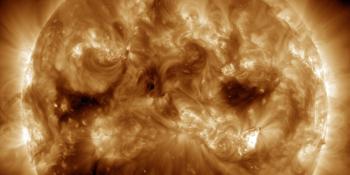Viewing archive of Thursday, 20 September 2012
Solar activity report
Any mentioned solar flare in this report has a scaling factor applied by the Space Weather Prediction Center (SWPC). Because of the SWPC scaling factor, solar flares are reported as 42% smaller than for the science quality data. The scaling factor has been removed from our archived solar flare data to reflect the true physical units.
Report of Solar-Geophysical Activity 2012 Sep 20 2200 UTCPrepared by the NOAA © SWPC and processed by SpaceWeatherLive.com
Joint USAF/NOAA Report of Solar and Geophysical Activity
SDF Number 264 Issued at 2200Z on 20 Sep 2012IA. Analysis of Solar Active Regions and Activity from 19-2100Z to 20-2100Z Solar activity was at low levels. Region 1574 (S22W70)
produced a C1/Sf flare at 20/1139Z. Over the period, the region
grew from a simple unipolar spot to a 4 spot bipolar group. All
other spotted regions indicated little change. No Earth-directed
CMEs were observed.
IB. Solar Activity Forecast
Solar activity is expected to be at
low levels with a slight chance for M-class activity for the next
three days (21 - 23 September).
IIA. Geophysical Activity Summary 19-2100Z to 20-2100Z
The geomagnetic field was at predominately quiet to unsettled levels
with a period of active conditions observed between 19/2100 - 2400Z.
The period began with wind speeds, as measured at the ACE
spacecraft, steady at 400 km/s while the Bz component of the
interplanetary magnetic field (IMF) was mostly south at about -10
nT. At about 19/2300Z, wind speed and temperature indicated slight
increases while IMF Bz began fluctuating between +8 to -6 nT. By
about 20/0100Z, the phi angle changed from a positive (away) to a
negative (toward) orientation. These changes were all indicative of
a co-rotating interaction region in advance of a coronal hole high
speed stream. By the end of the period, wind velocities were steady
at about 575 km/s while IMF Bz did not vary much beyond +/- 2 nT.
IIB. Geophysical Activity Forecast
The geomagnetic field is
expected to be at quiet to unsettled levels with isolated active
intervals for days one and two (21 - 22 September) as a coronal hole
high speed stream (CH HSS) remains geoeffective. By day three (23
September), mostly quiet to unsettled levels are expected as CH HSS
effects wane.
III. Event Probabilities 21 Sep to 23 Sep
| Class M | 15% | 15% | 15% |
| Class X | 01% | 01% | 01% |
| Proton | 01% | 01% | 01% |
| PCAF | green | ||
IV. Penticton 10.7 cm Flux
Observed 20 Sep 117 Predicted 21 Sep-23 Sep 115/115/120 90 Day Mean 20 Sep 122
V. Geomagnetic A Indices
Observed Afr/Ap 19 Sep 013/014 Estimated Afr/Ap 20 Sep 010/012 Predicted Afr/Ap 21 Sep-23 Sep 008/012-009/012-008/010
VI. Geomagnetic Activity Probabilities 21 Sep to 23 Sep
| A. Middle Latitudes | |||
|---|---|---|---|
| Active | 30% | 30% | 20% |
| Minor storm | 05% | 05% | 01% |
| Major-severe storm | 01% | 01% | 01% |
| B. High Latitudes | |||
|---|---|---|---|
| Active | 35% | 35% | 25% |
| Minor storm | 10% | 10% | 05% |
| Major-severe storm | 01% | 01% | 01% |
All times in UTC
Latest news
Latest forum messages
jsoc 108Unexplained proton activity 52AR4048 97Temporary Topic - Ongoing Solar Proton Events 14Unspecified geomagnetic activity 2188
More topicsSupport SpaceWeatherLive.com!
A lot of people come to SpaceWeatherLive to follow the Sun's activity or if there is aurora to be seen, but with more traffic comes higher server costs. Consider a donation if you enjoy SpaceWeatherLive so we can keep the website online!

Space weather facts
| Last X-flare | 2025/03/28 | X1.1 |
| Last M-flare | 2025/04/01 | M2.5 |
| Last geomagnetic storm | 2025/03/27 | Kp5 (G1) |
| Spotless days | |
|---|---|
| Last spotless day | 2022/06/08 |
| Monthly mean Sunspot Number | |
|---|---|
| February 2025 | 154.6 +17.6 |
| April 2025 | 147 -7.6 |
| Last 30 days | 129.8 -18.9 |


